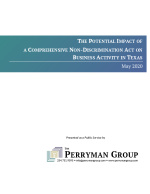The Potential Impact of a Comprehensive Nondiscrimination Act on Business Activity in Texas
Published on May 27, 2020

Discrimination in employment, housing, and access to public places such as restaurants, hotels, and shops leads not only a loss of dignity and opportunity for those on the receiving end of such treatment, but also involves significant economic costs stemming from both a diminished ability to attract knowledge workers and reduced opportunities for tourism, conventions, and related activity. In the aftermath of the COVID-19 pandemic, these issues become even more important. Competition for quality development will markedly intensify as various states and countries seek to revitalize their economies, and firms employing highly trained workers will expand their emphasis on social governance and community environments. Similarly, as the tourism and hospitality sector seeks to rebound from the massive losses from recent restrictions, the efforts to attract major events and promote local venues will escalate notably. Comprehensive Non-Discrimination Acts (CNDAs) can help reduce discrimination and send a definitive signal that an area will not tolerate such practices in the workplace, public venues, and other settings.
In particular, the LGBTQ community has been a focus of discriminatory concerns. There have been high profile instances of bias in employment, housing, and access to public places. Moreover, this group has not specifically been identified in national non-discrimination legislation. While an overall employment non-discrimination act has been proposed in Congress in all but one legislative session since 1994, it has yet to be enacted. As a result, protections have largely fallen to states to implement.
According to a study conducted by Freedom for All Americans, approximately 20 states have enacted legislation to protect LGBTQ individuals from workplace discrimination. Nonetheless, UCLA's Williams institute estimates that half of all LGBTQ workers in the United States live without specific employment protections, more than four million people. Similarly, several states have enacted specific limitations on the use of public places, and housing access remains an issue.
Texas has not yet passed a CNDA to protect the LGBTQ community. The Perryman Group (TPG) recently examined the potential economic benefits of passing a non-discrimination in employment, housing, and public places access act, as well as the associated increase in tax receipts to the State and local governments. Economic benefits were measured for the state and all Texas Metropolitan Statistical Areas (MSAs) and regions. This report and the accompanying Appendices describe The Perryman Group's results as well as the methods and assumptions used in this assessment. While the information underlying this analysis reflects the period prior to the health crisis and resulting economic downturn, it is likely that the effects are even more pronounced in the aftermath.
For more information, please refer to the following resources:
- Report (PDF)
- [Infographic] The Economic Benefits of Statewide LGBTQ Nondiscrimination in Texas (www.perrymangroup.com)
- Tags: CNDA, discrimination, LGBTQ, nondiscrimination, technology, tourism